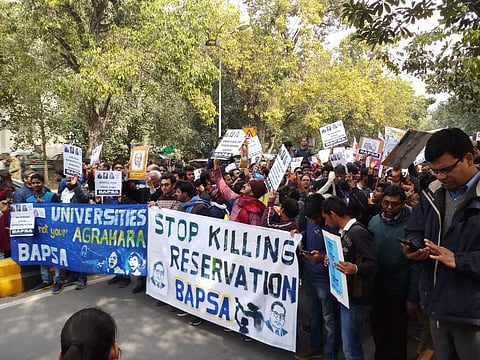

The vacancies in reserved category faculty and non-faculty posts in all Indian Institutes of Science Education and Research (IISERs) and Institute of Science (IISc) has led the Ministry of Education to constitute a special cell within it. This cell will supervise recruitment to these posts through timely advertisement and proper maintenance of roster registers. The cell will be led by Priyank Chaturvedi, the Deputy Secretary (IIIT/IISERS/HEFA). In a letter to all IISER and IISc directors, dated January 5, he said that liaison officers for SC/ST/OBC/PwD in these institutes will coordinate with this cell constituted in the Ministry.
As per the Education Ministry's response in the Lok Sabha, in August last year, the seven IISERs across the country have a total of 28 out of the 71 sanctioned posts for the Scheduled Castes vacant (39.43%), 11 out of the total 19 for Scheduled Tribes stand remain vacant (57.89%) and 67 out of the 153 for Other Backward Classes are also vacant (43.79%).
The situation in terms of empty OBC posts is worse in the Indian Institute of Science (IISc) where 89.76% of the posts reserved for them remain vacant — 272 out of the total 303 posts (89.76%) for OBC candidates are vacant at IISc, 46 out of the 86 posts for STs are vacant (54.76%) and 34 out of the 168 posts for SCs remain vacant (20.23%) as per the latest accessible data.
Replying to the Communist Party of India's M Selvaraj, a Lok Sabha MP from Tamil Nadu's Nagapattinam constituency, Education Minister Dharmendra Pradhan had listed out the reserved category vacancy data at various Central institutions and had said that the UGC — through letters sent out on July 31, August 7, September 5 and October 22 back in 2019 — had requested the universities to ensure that vacant positions are filled at the earliest. Pradhan, in the written response, had said, "However, the onus of filling up the vacant posts lies with the Central Universities, which are autonomous, created under Acts of Parliament."
The liaison officers have been asked to maintain a record of grievances received with regard to recruitment from reserved category applicants and the details of action taken on any such grievances. They have also been asked by the authorities to send a monthly report to the Ministry on inspection of reservation rosters, their proper maintenance and advertisement and filling up of various faculty/non-faculty posts. The liaison officers are also to maintain a copy of the recruitment advertisement and preserve details of special recruitment drives. Attempts were made to contact Deputy Secretary (IIIT/IISERS/HEFA) Priyank Chaturvedi, but he remained unavailable for comments at the time of this report.
Kiran Kumar, the National President of the All India OBC Students' Association (AIOBCSA), said that it is a welcome move, however, he was quick to express his apprehensions. "We welcome the ministry's letter asking them to maintain the roster and submit the report every month. But we are only apprehensive about how these institutions will respond to these notices." Kumar said that compliance to directions on part of the institution is a matter of concern.
Reservation policies for recruitment at premier science and technology institutions in India have had a murky record for some time now and IISER and IISc is no exception to this. A news feature in a reputed international magazine, Undark, points out that IISc had two Dalit professors and 205 General Category professors in 2020 and had no Dalit department heads during the same year. Many dominant caste professors from India's top science institutions, including IISc, interviewed by the magazine, had a similar thing to say about reservation policies — they believed that reservation for marginalised communities is essential only to a certain level, like admission to doctoral programs, but shouldn't apply at senior positions.
A study conducted by the Students' Federation of India (SFI), even claimed that dropout rates of students from several reserved communities are over 60 per cent in the IITs, NITs, IISERs among other Centrally Funded Technical Institutions (CFTIs). Many experts attribute these dropout rates to the harassment faced by reserved category students either from their classmates or from their dominant caste professors among other things.
